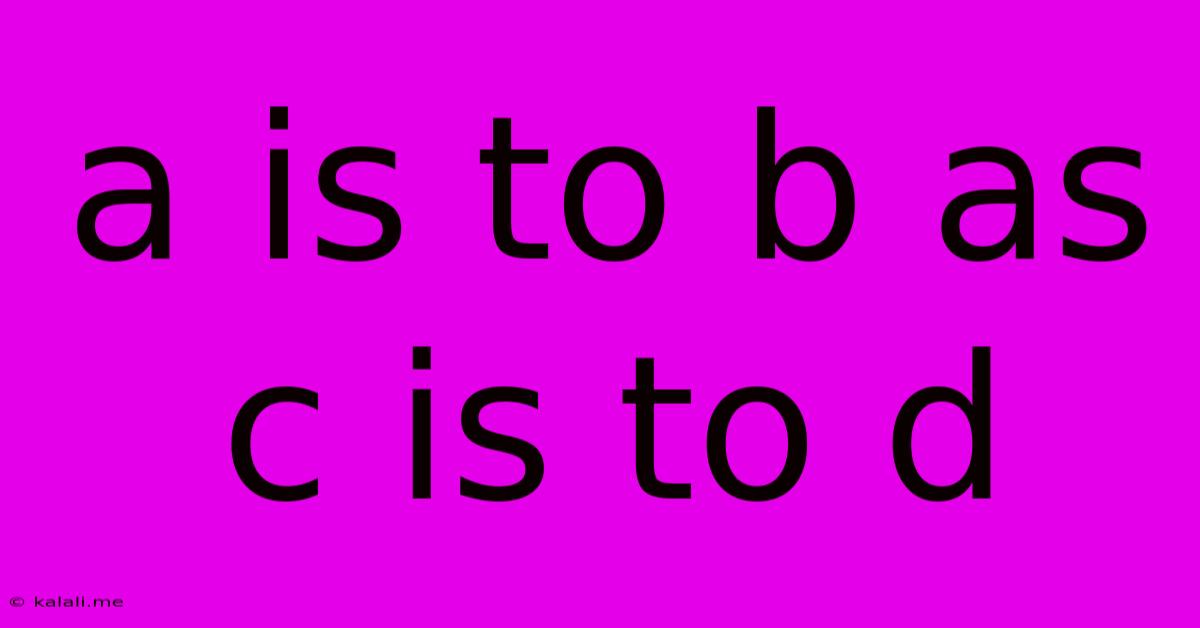A Is To B As C Is To D
Kalali
May 24, 2025 · 3 min read

Table of Contents
A is to B as C is to D: Mastering Analogies for Enhanced Communication and Problem-Solving
Analogies, expressed as "A is to B as C is to D," are powerful tools for understanding complex concepts, fostering creativity, and improving communication. They work by highlighting similarities between seemingly disparate things, allowing for a deeper comprehension of relationships and patterns. This article explores the nuances of analogies, their applications, and how to effectively construct and interpret them. Understanding analogies is crucial for various fields, from standardized testing like the SAT and GRE to problem-solving in everyday life and building strong persuasive arguments.
What is an Analogy? A Deep Dive into Relationships
At its core, an analogy is a comparison between two things that are similar in some respects, despite their obvious differences. The classic format, "A is to B as C is to D," represents a proportional relationship. A and B share a specific relationship, and the analogy posits that C and D share a similar relationship. For example:
-
Hot is to cold as up is to down. Here, "hot" and "cold" are antonyms, just as "up" and "down" are. The relationship is one of opposition.
-
Dog is to canine as cat is to feline. This illustrates a classification relationship. "Dog" is a type of "canine," and "cat" is a type of "feline."
This seemingly simple structure holds significant cognitive power. By mapping the familiar relationship between A and B onto the less familiar relationship between C and D, we gain insight and understanding. This process involves abstract thinking and the identification of underlying principles.
Types of Analogies and Their Applications
Analogies aren't limited to a single type. They can represent various relationships, including:
- Synonym Analogies: These compare words with similar meanings (e.g., happy : joyful :: sad : sorrowful).
- Antonym Analogies: These pair words with opposite meanings (e.g., large : small :: hot : cold).
- Part-to-Whole Analogies: These illustrate a component's relationship to a larger entity (e.g., wheel : car :: petal : flower).
- Function Analogies: These focus on the purpose or role of something (e.g., teacher : educate :: doctor : heal).
- Cause-and-Effect Analogies: These illustrate a causal link (e.g., fire : smoke :: rain : flood).
Understanding these different types expands the potential applications of analogies. They are valuable in:
- Education: Simplifying complex topics by relating them to familiar concepts.
- Problem-Solving: Finding solutions by comparing a current problem to a similar, solved problem.
- Persuasion: Building arguments by drawing parallels to commonly accepted ideas.
- Creativity: Generating new ideas by combining elements from different domains.
- Critical Thinking: Analyzing arguments by identifying underlying assumptions and relationships.
Constructing and Interpreting Effective Analogies
Creating strong analogies requires careful consideration of the relationship between the terms. The relationship must be clear, consistent, and relevant to the point you are trying to convey. Ambiguity weakens the analogy's impact. Similarly, interpreting analogies requires critical thinking to identify the underlying relationship and assess its validity. Consider the context and the potential for misleading comparisons.
Beyond the Basics: Using Analogies for Advanced Communication
Mastering analogies extends beyond simple word pairings. They can be used to build sophisticated arguments and explanations. Consider the use of extended analogies, which draw parallels across multiple points of comparison, providing a richer and more persuasive explanation. By understanding the principles governing analogies, you can improve your communication skills, enhance your problem-solving abilities, and unlock new levels of creative thinking. The power of "A is to B as C is to D" lies in its simplicity and its capacity to illuminate complex relationships, making it a fundamental tool for effective communication and understanding.
Latest Posts
Latest Posts
-
Cannot Initiate The Connection To Us Archive Ubuntu Com 2024
May 24, 2025
-
What Does Open Ground Mean On An Outlet Tester
May 24, 2025
-
How To Turn Off Save Game Gta V
May 24, 2025
-
Do You Need An Id To Ride Greyhound Bus
May 24, 2025
-
How To Remove Dark Water Stains From Wood
May 24, 2025
Related Post
Thank you for visiting our website which covers about A Is To B As C Is To D . We hope the information provided has been useful to you. Feel free to contact us if you have any questions or need further assistance. See you next time and don't miss to bookmark.